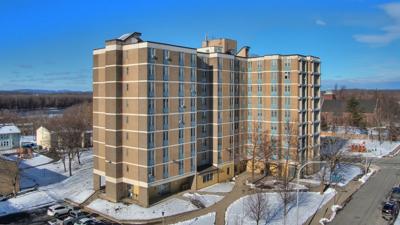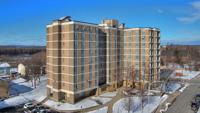HUDSON — The Hudson Housing Authority is moving forward with plans to demolish Bliss Towers and rebuild public housing in the city.
The demolition of the nearly 50-year-old structure would also include Columbia Apartments, which are the low-rise units on the same property as the high-rise building. The Authority will have to prove to the U.S. Department of Housing and Urban Development that repairing its housing would cost more than building new.
The Authority’s Board of Commissioners is releasing a draft Request for Qualifications to the public in the coming days. It will be available on the Hudson Housing Authority website and in the office. An official public hearing on the RFQ draft will take place 6 p.m. July 7 before the RFQ is officially put out to developers.
The goal of the Request for Qualifications is to find a developer to demolish and reconstruct the city’s public housing, said Timothy Mattice, Hudson Housing Authority executive director.
A Request for Qualifications is less specific than a Request for Proposals, Mattice said Thursday. Essentially, the board is asking developers to explain their qualifications to demolish Bliss Towers and take on the redevelopment of public housing in Hudson.
“Basically, we’re asking for developers who are in this industry to send us your qualifications, your experience and basically your portfolio in doing what we’re asking for in this RFQ,” Mattice said.
The Board of Commissioners decided to move forward with the project idea after gathering feedback from tenants and the community.
“The Hudson Housing Authority has approved the draft RFQ for development of the property currently occupied by Bliss Towers and Columbia Apartments,” the Hudson Housing Authority Board of Commissioners said in a statement Thursday. “The plans include demolition of Bliss Towers as well as exploring options to expand throughout the city. This decision was not easy but was led by tenant and community feedback. Our goal is to provide our tenants with a bright future and quality of life that matches the momentum of our ever-growing city. While we are facing a crisis around affordable housing, we take great pride in being able to offer a project of this magnitude with our residents’ wants and needs as our guide from start to finish.”
HUD has to give its approval before public housing is demolished and the local community has to give input, Mattice said. The board will make a formal request to HUD and relevant entities after a development partner is brought on for the project.
The housing authority will have to prove to HUD that the cost of repairs to public housing in Hudson would be greater than developing new, Mattice said.
While the board believes the expense is greater to rehabilitate its housing than to build new, the future developer will conduct an assessment of the housing to provide a cost comparison with construction models, Mattice said.
“The building infrastructure has outlived its useful life,” Mattice said.
From mechanical glitches to plumbing issues, outdated building amenities and bathroom fixtures, the list can go on with problems in the building, Mattice said. The roof is in disrepair and the windows and elevators are outmoded.
“The list could go on and on of all the things that have really outlived their useful life and function ability,” he said.
Board Chairwoman Revonda Smith said she grew up in Bliss Towers and believes the time has come for Bliss Towers to come down. The building was constructed in 1973, Smith said.
“I was born and raised on this property,” she said Thursday. “I still have my parents, my siblings, my cousins and relatives still living on the property, even families that were the first ones to move in, in 1973. This project was done in 1973 and I want to give them something new. It is under infestation and I’m ready to put it in the history books and give them something brand new.”
The Hudson Housing Authority has 135 units of housing and 115 are occupied, Smith and Mattice said. The unoccupied units are inhabitable and in need of a full gut renovation.
The tenants in the 115 occupied units would be moved to replacement housing before their home is demolished.
“No one would be displaced,” Smith said.
It will be up to the chosen developer where the replacement housing will be constructed, Smith said. The replacement housing will ultimately be part of the completed development.
It would be up to the tenants whether they want to stay in the replacement housing, Smith said.
Even if all the tenants do not move into the replacement housing, the Authority will have to find them new homes, Mattice said. “It is the responsibility of the Housing Authority to find suitable housing, or better, for the residents if they are displaced from their current apartment,” he said. “So no one will lose housing. They will be placed either in new housing that we build or housing that already exists somewhere. So they will not lose their housing and HUD will require us to submit a relocation plan as part of the overall project.”
One option is for the developer to begin by demolishing the low-rise units and utilizing vacant land on the property to develop replacement housing before taking down the high-rise, Mattice said.
The Hudson Housing Authority does not have a plan yet for how the redevelopment will be funded, Mattice said.
“There are a number of funding programs that are used to rebuild or rehabilitate public housing and we’ll be looking at all the funding opportunities that are available,” he said.
The Low-Income Housing Tax Credit program is a popular option for funding rehabilitation or redevelopment of affordable housing and is typically combined with other funding sources, Mattice said. Other funding can come through traditional lending mechanisms or grant programs. The developer would look investigate funding options.
“The developer would do a lot of the heavy lifting for the Housing Authority and they would be looking at all the potential funding mechanisms that would be available to help develop a project budget for the financing of this idea,” Mattice said.
Mattice and the board do not know yet what financial contribution the Hudson Housing Authority will make, he said. “I think we’ll have to go and determine that when we begin to structure the finances of the project,” he said.
HUD did not immediately respond to requests for comment.









